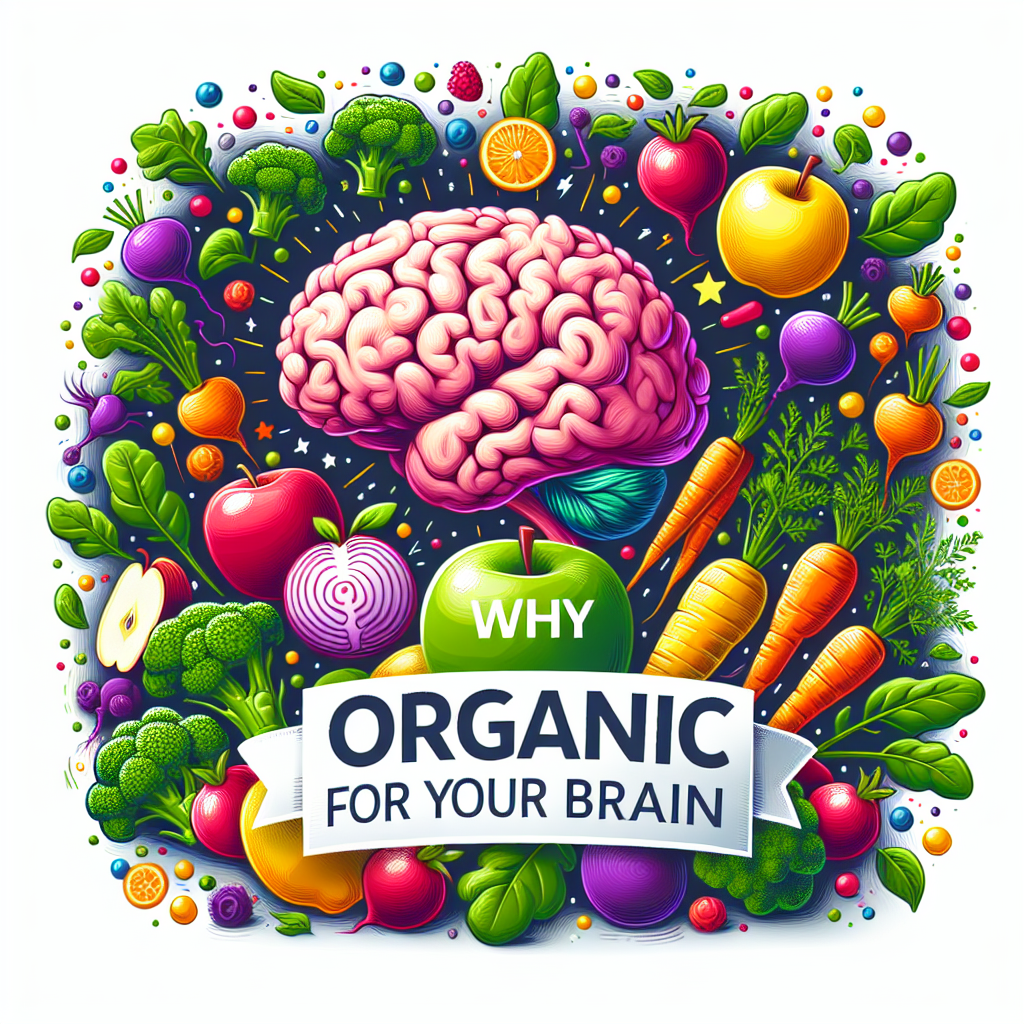The Connection Between Organic Food and Brain Health
In recent years, the importance of diet in maintaining cognitive function has gained significant attention. Organic foods, free from synthetic pesticides and fertilizers, offer a natural way to enhance brain power. Studies suggest that organic food consumption may improve memory, focus, and overall mental clarity by reducing exposure to harmful chemicals and increasing nutrient intake.
Why Organic Matters for Your Brain
Organic farming practices prioritize soil health and biodiversity, resulting in crops that are often richer in essential nutrients like antioxidants, omega-3 fatty acids, and vitamins. These nutrients play a crucial role in brain health by reducing oxidative stress and inflammation, two key factors linked to cognitive decline.
Top Organic Foods for Cognitive Function
Certain organic foods stand out for their brain-boosting properties. Incorporating these into your diet can provide long-term benefits for mental clarity and memory retention.
Berries: Nature’s Brain Fuel
Organic berries like blueberries, strawberries, and blackberries are packed with flavonoids that enhance neuronal communication and protect the brain from oxidative stress. Studies show that regular berry consumption can improve memory and delay age-related cognitive decline.
Leafy Greens: The Ultimate Brain Protectors
Organic spinach, kale, and Swiss chard are rich in folate, vitamin K, and lutein – nutrients essential for cognitive function. Research indicates that people who consume more leafy greens have slower rates of cognitive decline compared to those who eat less.
Nuts and Seeds: Powerhouses of Brain Nutrients
Organic walnuts, almonds, flaxseeds, and chia seeds provide healthy fats, vitamin E, and antioxidants that support brain health. The omega-3 fatty acids in walnuts, in particular, have been linked to improved cognitive performance and reduced inflammation in the brain.
Fatty Fish: Omega-3 Rich Brain Food
Wild-caught organic salmon, sardines, and mackerel contain high levels of DHA, a type of omega-3 fatty acid that’s crucial for brain development and function. These healthy fats help build brain cell membranes and may reduce the risk of cognitive disorders.
How to Incorporate Organic Brain Foods Into Your Diet
Transitioning to an organic diet for better cognitive function doesn’t have to be difficult. Here are practical ways to include these brain-boosting foods in your daily meals:
Simple Organic Breakfast Ideas
- Organic Greek yogurt with mixed berries and walnuts
- Spinach and mushroom omelet made with organic eggs
- Chia seed pudding with organic almond milk
Brain-Boosting Lunch Options
- Organic kale salad with avocado, walnuts, and wild salmon
- Quinoa bowl with organic roasted vegetables and pumpkin seeds
- Organic turkey and spinach wrap on whole grain tortilla
Nutritious Organic Dinner Recipes
- Grilled organic salmon with steamed broccoli and sweet potato
- Organic chicken stir-fry with mixed vegetables over brown rice
- Lentil soup with organic kale and turmeric
The Science Behind Organic Food and Cognitive Function
Multiple studies have demonstrated the connection between organic food consumption and improved brain health. A 2018 study published in the journal “Environmental Research” found that people who ate organic foods had higher cognitive test scores than those who consumed conventionally grown foods.
Reduced Exposure to Neurotoxins
Conventional farming often uses pesticides that may be neurotoxic. By choosing organic, you reduce exposure to these potentially harmful chemicals that could affect cognitive function over time.
Higher Nutrient Density
Organic foods typically contain higher levels of certain nutrients that are vital for brain health, including:
- Antioxidants (up to 69% more than conventional foods)
- Omega-3 fatty acids (50% higher in organic dairy and meat)
- Vitamin C and other brain-protective compounds
Long-Term Benefits for Brain Health
Making organic foods a regular part of your diet can provide lasting benefits for cognitive function:
Reduced Risk of Neurodegenerative Diseases
The antioxidants and anti-inflammatory compounds in organic foods may help protect against Alzheimer’s and Parkinson’s diseases by reducing oxidative stress in the brain.
Improved Memory and Focus
Regular consumption of organic brain foods has been associated with better memory retention, faster information processing, and improved concentration.
Enhanced Mood and Mental Well-being
The gut-brain connection means that eating clean, organic foods can positively impact neurotransmitter production, potentially reducing symptoms of anxiety and depression.
Tips for Transitioning to an Organic Brain-Boosting Diet
Switching to organic doesn’t have to happen overnight. Here are some practical tips to make the transition easier:
- Start with the “Dirty Dozen” – prioritize organic versions of produce known for high pesticide residues
- Gradually replace conventional pantry staples with organic alternatives
- Shop at local farmers’ markets for fresh, seasonal organic produce
- Consider joining a CSA (Community Supported Agriculture) program for regular organic deliveries
- Grow your own organic herbs and vegetables, even in small spaces
By making conscious choices about the foods we eat, we can naturally support and enhance our cognitive function. While organic foods might require a slightly higher initial investment, the long-term benefits for brain health make it a worthwhile choice for maintaining mental clarity and preventing cognitive decline as we age.

